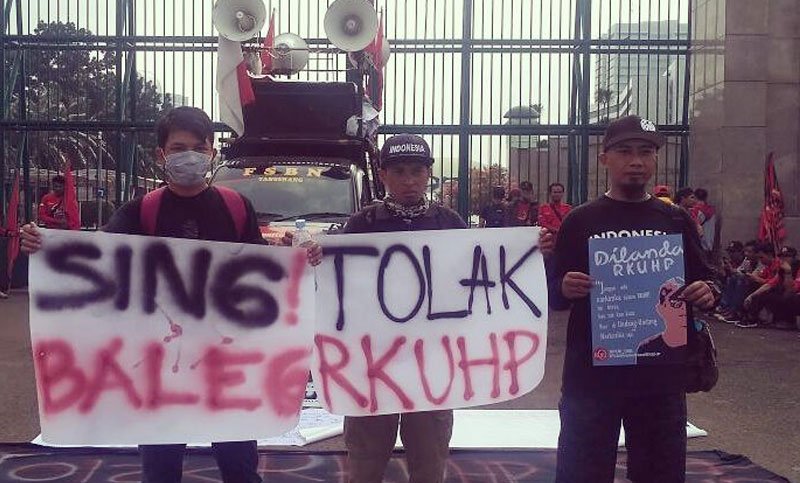By Aditia Taslim, Asia and the Pacific NGO Delegate
Executive Director of Rumah Cemara, Indonesia
Recently, a draft of revisions to the Book of Penal Code[1], known as KUHP was submitted to the Parliament of Indonesia. The revision of KUHP is seen by many civil society organisations and alliances as an insult to the democratic process in Indonesia. If approved, the revision will enforce further criminalisation of women, children, indigenous peoples and other marginalised groups, including people living with HIV (PLHIV) and people from the lesbian, gay, bisexual and transgender (LGBT) community.
Indonesia ranks third in terms of new HIV infections in Asia and the Pacific with 48,000 new cases registered in 2016. Of an estimated 620,000 people living with the virus, only 35% are aware of their status. Of that number, only 13% have received antiretroviral (ARV) treatment and there is no data available for the number of people who have achieved viral suppression[2]. This situation depicts how Indonesia is one of the countries that is left behind in the progress towards achieving the UNAIDS 90-90-90 targets to end AIDS by 2020 and the 2016 United Nations Political Declaration on Ending AIDS[3].
The Ministry of Health, through its HIV/AIDS National Strategic Plan of 2015-2019, includes Goal number 5, which is to develop an enabling environment[4]. Based on this target, the government and civil society must have significant roles in the AIDS response. Laws and law enforcement practices should support people living with HIV and most-at-risk populations to access essential HIV services, not drive them away. The practice of punitive laws will only become counter-productive and create barriers to access, which will also lead to violations of human rights, gender inequality, and stigma and discrimination towards key populations.
Some of the threats mentioned above[5] include penalties for promotion of condoms and other contraceptives if done by unauthorised individuals; imprisonment for adultery for extramarital sex and homosexuality; penalties for offering transactional sex; and, imprisonment of people who use drugs, over-ruling the diversion policy under the Narcotics Law No. 35 year 2009 about provision of medical and social rehabilitation.
These attempts to over-criminalise sexual behaviour, contraception tools, and sex work will create fear in society and hinder people from accessing services. Most importantly, it will prevent people from getting tested for HIV and seeking treatment and care.
The Ministry of Justice and Human Rights claims that the government is putting the right strategy to prevent and control HIV through these punitive laws. With the over-criminalisation approach that is imprisonment-oriented, we have to also be extremely worried of shifting the prevalence to prison populations. As of January 2018, there were 234,130 detainees and prisoners in Indonesia where the capacity only allows for 124,117 people[6]. With the extremely overcrowded prisons, and the potential imprisonment based on these new laws, prison populations will be at even more-at-risk of HIV and other co-morbidity infections such as TB and Hepatitis, particularly when condoms and other tools are not made available for prevention.
Since December 2017, Rumah Cemara has been involved in participating in a series of discussions about this issue. Along with other civil society organisations, legal institutions, key population networks and others, an alliance was formed under a name, National Alliance to Reform KUHP.
February 14, 2018 was the date that the Parliament chose to decide on the proposed revision of KUHP. Having known this information, the National Alliance had made several attempts to increase pressure on the Parliament. These attempts included a high-frequency campaign through articles, policy briefs, press releases, a petition, infographics, public discussions and publications aimed at increasing public awareness on the discussions in Parliament. At the peak of the resistance, a strike was held on Monday, February 12, two days prior to the Plenary Meeting of the Parliament with a hashtag, #tolakRKUHPngawur (refuse inconsequent revision of KUHP).
The strike involved about 200 people from different organisations, mainly from the National Alliance to Reform KUHP. About 50 people from Bandung, the host city of Rumah Cemara, travelled to the House of Representatives on a bus to join fellow comrades in Jakarta. Despite having no clearance or permit to undertake a strike, the National Alliance did not withdraw the plan. As a result, representatives of the National Alliance were invited to enter the Parliament building to meet with some of the officials; our recommendation to stop over-criminalising laws under the revision of KUHP was noted for further discussions.
February 13th, 2018, the Parliament decided to postpone the Plenary Meeting on the revision of KUHP due to increasing pressure from civil society and the controversy it generated, including a disagreement within the Parliament. The decision to postpone will allow us, the National Alliance, and other civil society groups, to continue watching over the process, and to ensure that discussions are focused on protecting the rights of women, children, indigenous people and marginalised communities. This is not yet a victory.
As a Joint Programme of the United Nations, UNAIDS has successfully brought together Member States to commit to a historic agreement to end AIDS by 2030. The Fast Track commitments include three crucial goals, fostering collaborative efforts between governments, people living with HIV, civil society, and other stakeholders. Indonesia currently sits as a member of the UNAIDS Programme Coordinating Board (PCB) with a term ending in 2019. It is therefore critical for the authorities to step back and review this punitive initiative. If the proposed revision of KUHP is successful, achieving these shared goals will not only be difficult, it will be impossible.
As members of civil society and communities, we call upon UNAIDS and Cosponsors to use its political power to create external pressure on the government of Indonesia to withdraw the punitive laws that will threaten the achievement of the Fast track and 90-90-90 targets to end AIDS by 2030.
[1] House of Representative of Republic of Indonesia, Draf Rancangan Undang-Undang Hukum Pidana, (LINK)[2] UNAIDS, Country Factsheets – Indonesia, 2016, (Link)
[3] Adopted resolution by the United Nations General Assembly, Political Declaration on HIV and AIDS: On the Fast Track to Accelerating the Fight against HIV and to Ending the AIDS Epidemic by 2030, (Link)
[4] Ministry of Health of Republic of Indonsia, Strategi dan Rencana Aksi Nasional 2015-2019 – Penanggulangan HIV dan AIDS di Indonesia, (Link)
[5] Institute for Criminal Justice Reform, Distribusi Ancaman Pidana dalam RKUHP dan Implikasinya, (LINK)
[6] Ministry of Justice and Human Rights of Republic of Indonesia, January 2018 – Data of General Directorate of Correctional Service, (LINK)
[AdSense-A]






